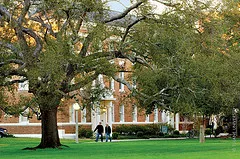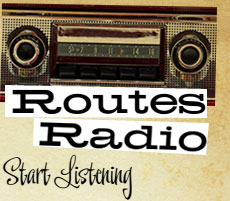
Since the spring of 2009, American Routes, a public radio program reaching up to a million people weekly on 200 stations, has called Tulane University its home. Produced in its studio at Alcée Fortier Hall, with the support of the National Endowment for the Humanities and the Louisiana Endowment for the Humanities, it is a cooperative venture with the School of Liberal Arts, relying upon faculty advisors, staff, student workers, and service learners.
As reflected in its name, American Routes combines the metaphor of travel “routes” and its homonym “roots” as an organic metaphor. It strives to convey ideas creatively about vernacular music and culture in the Gulf South and more broadly in America. It offers a way to interpret social and cultural meanings of lyrics and musical styles in jazz and blues, country and gospel, Cajun and zydeco, Tejano and Latin tropical, roots rocks and soul, among others – all with an emphasis on the contiguous city and region of New Orleans and south Louisiana.
Based on my field work in the region for over three decades, American Routes uses aesthetic forms to delve into issues of differential cultural identities of Cajuns, Creoles, Native Americans, French, Spanish, African Americans, Anglo Americans and others at the community level. We explore where their cultures may have creolized and been shared, or where they remain separate and distinct. We examine the ecological future of the coastal marshlands and bayous as well as the role that expressive culture – Mardi Gras, Cajun and Creole languages and music, jazz second lines, traditional New Orleans cuisine and building arts – will play as an agent of return and recovery in the city and region.
In addition to carefully crafted musical segues and brief critical commentary about the music, American Routes presents conversations with artists ranging from the late Ray Charles and Nina Simone, to Dr. John, Allen Toussaint and Willie Nelson. Less well-known individuals – chefs, tap dancers, street car drivers, All Saints Day celebrants or the residents of a historically black coastal resort – are also subjects of the program’s documentary features. In convening an array of voices, known and unknown, as an American vernacular soundscape on public radio, American Routes makes statements about the meanings, styles and textures of American life with words and music as the primary semantic and sonic elements.
American Routes has also become part of the academic fabric of SLA. As a folklorist, I annually offer a grad/undergraduate course on ethnography of performances and symbols of the Gulf South that includes theory, documentary practice and expressive cultural forms that are also essential to the production of the radio program. In addition, through my current service learning-based course: “The Interview: Cultural Conversation and Cultural Conservation,” students are deeply involved in working with the program. They recently documented the annual Prince of Wales Social Aid and Pleasure Club parade with audio, video and photography, for use by the Club and the non-profit resettlement agency that is assisting them, Sweet Home New Orleans. The results will also be part of our website and will be heard on American Routes.
It’s a privilege to teach at Tulane combining research, creative and scholarly work, with concern for engaging music and musicians, citizens and communities locally and nationally in dialogs about cultural continuities (roots) and transformations (routes) to build a public discourse in the vernacular humanities. I hope you will join us in this exploration.
Dr. Nick Spitzer holds degrees in anthropology from Penn and the University of Texas. A professor of American studies and anthropology at Tulane, he is widely known for his ethnographic work in south Louisiana communities, theory and practice in public folklore, and documentary media productions. A Fellow of the American Folklore Society, he was named Humanist of the Year in 2006 for his work on cultural restoration after the deluge, and later received a Guggenheim Fellowship for research on traditional forms of creativity in Louisiana Creole culture.


